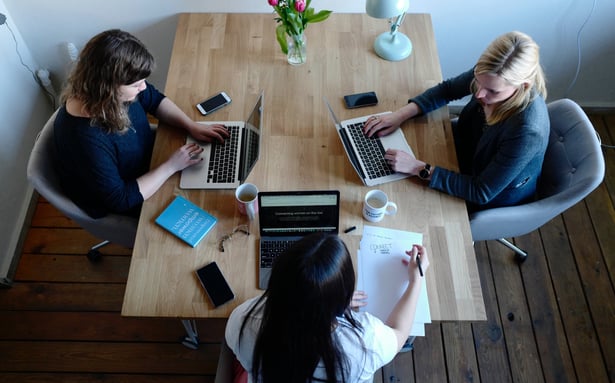
Approximately 16% of Business Growth Programme (BGP) participants that have come through the course over the past decades have been female, yet UK stats show that a third of start-ups in the UK are run by women. For the past years we have been working closely with the Jennifer d’Abo Scholarship to fund female entrepreneurs to participate in the Business Growth Programme, which represents a brilliant opportunity for them to achieve the business goals that otherwise they might not have achieved.
This year the Scholarship is providing funding for several female-led businesses and to raise awareness of the initiative we have reached out to women who have taken their own business through the BGP to hear their perspectives on being a women in the world of entrepreneurship, and their advice for women starting out.
What is interesting is the mix of answers we received, making us question what the factors are that contribute to being a successful female entrepreneur – does it depend on personality, does it depend on the industry sector or is it something else? We’re not drawing any generalised conclusions from the interviews, rather, we wanted to provide readers with opinions and insights from women who have been through it. So, here are the responses from some of our fantastic female BGPers.
The business women:
Annika Bosanquet, Co-Founder & Managing Director, Wrapology
Sarah Millar, Founder and Creative Strategist, Sister London
Debra Charles, Founder and CEO, Novacroft
Jane Lambert, CEO, Emergency Care Gateway Ltd (T/A ECG)
Rosie Eisenstadt, Director, MGP Ltd
Eleanor Harris, Director and Highly Specialist Speech and Language Therapist, Magic Words Therapy
Q: What made you decide to start your own business?
AB: I was excited by an idea that a colleague had and I just couldn’t help but go for it! I felt my previous employer had restricted growth for my career as I was not a specialist and was doubtful of working long term in a corporate structure.
SM: I met my business partner Kay Copeland and realised that we were like-minded and shared a vision, so we decided to launch Sister. By creating a brand and launching Sister we were able to attract an excellent team and more clients. We are celebrating 20 years in business in 2020.
DC: I had a clear vision and business model and wanted to make a difference. I also had a total lack of fear resulting from the loss of my parents 6 months prior to starting Novacroft (after-all, the worst that could happen, had already happened!!)
JL: I always knew I wanted to have my own business but never knew what it would be. I came to a point in my nursing career when I loved what I was doing but not under the constraints of the NHS, and that's when I identified an opportunity and grabbed it. I had some reflection time away on a long holiday to consider my decision and felt very comfortable to come back and make that jump!
RE: My husband had the chance to take a redundancy package and after a short consultancy role saw an opportunity to start our own company. I decided to leave my job and join him to give it the best possible chance of success. I'm not a risk taker so my suggestion that I leave a paid job to devote time to our business left his jaw on the floor but it meant although we had no income for 8 months and lived on the redundancy money we were both really focused.
EH: Work flexibility, to have a sense of achievement, to have a sense of autonomy. To prove I could.
Q: What is the biggest challenge as a female business owner that is different from what your male counterparts’ experience?
AB: I have a family and I want and feel the need to spend time with my young children which means I’m there for pick up and holidays or arranging suitable childcare. Male counterparts are prepared to work 8-late or totally clock off when family happens; they cannot seem to plan for this balance and nor can my husband; I run the company and the home (my mother only had to run the home and my dad go to work).
SM: I haven't experienced differences.
DC: I don't see there are bigger challenges for women, just possibilities. For example, if a women is underestimated it gives that women a competitive advantage.
JL: I think if you are good at what you do, passionate and confident about your business then your strengths naturally shine through. It's often about being 'taken seriously' but when you earn that respect (in my sector it’s about being a thought leader in your field) then it feels like you are on an even level. The one thing many women worry about is having childcare responsibilities more heavily weighed on them and how that can affect the perception of their role and capabilities. I work part time and I'm very open and clear about the importance of my family to me, and actually I have seen nothing but respect for that, rather than a hindrance in their eyes.
RE: In the early days (with three people working from our house) those hours when small children came home from school and holiday times were challenging. A new baby after 9 months (not in the business plan!) meant an earlier move out to offices than originally planned with associated increased costs. Night feeds often involved doing computer work at the same time to make best use of the hours. Overall giving appropriate time to both work and children and trying not to feel guilty about both, was the most difficult issue.
EH: Being expected to be the organiser/giver of childcare, family diary, family commitments, elderly parent care, buyer of presents/cards, organiser of holidays as well as leading and running a busy business. Not often, but occasionally dealing with people (most men) that assume as female business leaders we must be 'too nice'.
Q: What do you feel is the biggest advantage of being a female in business compared to any male entrepreneurs that you know?
AB: None - it’s a hindrance. I’m in finance and logistics which is male heavy and there are a lot of closed minds. Around half the time we get lucky and find partners who are blind to gender and gender behaviour but rarely until the value of the contract is clear. In the old days, I had to create the alias “Alan Smith” just to get emails answered.
SM: I don't think there are any advantages. May the best company win the business.
DC: At Transport sector events the ladies loos never have a queue!
JL: Relationships, relationships, relationships. I am a firm believer that people buy from people. I think that women often find it easier to build and maintain effective working relationships. Whether that be looking after your own team, or building those key relationships with clients who then want to work with you, we do that well!
RE: I can only speak for our situation but having both of us with different perspectives (my husband sales-focused and me operations-focused) meant that we made good balanced decisions. We are both good at understanding issues employees have outside their work hours and being flexible around family but I feel that many male entrepreneurs of our age group (maybe younger ones are better) don't understand how complicated childcare can be and this usually (but not exclusively) affects women more.
EH: To be honest, I see us as equal and don't know that there is an advantage.
Q: What advice would you give other female entrepreneurs that have recently started a business?
AB: Be succinct and direct in your communication. Be clear with what you’re asking. Always come prepared with the commercial outcome in mind. Be prepared to compromise to reach the commercial goal and keep away (initially) from the detail. Don’t use emotions or get personal (unless playing to an opposite interest that you can discuss such as sport or business).
SM: Follow your instinct and vision. A well thought-out business strategy is essential but also be ready to update it. Stay current, watch your competitors.
DC: My prescription would be to:
- tell your inner voice ten times a day that you are really good at what you do
- stand tall, you are amazing
- there is no one like you
- believe in yourself
- be a great storyteller
- engage diverse minds
- be resilient
- kick ass when you need to (run toward problems)
- be kind and be authentic
- laugh and have fun along this amazing journey of life.
JL: Network, get out and talk to clients or prospective clients, really listen (rather than talk at them) to what their problems or headaches are and then focus on how you can help solve them. It's OK to work part time, if that suits you, and it's ESSENTIAL to maintain your work life balance, and also your own resilience (as many of us have families too). Keep smiling, know your stuff, LOVE 'your stuff' as passion is infectious and people will want to be part of it. Never forget the little things in life (I reach out to people on a personal basis where I can). Have a very clear strategy and vision and share it with those on your journey and in your team. Celebrate successes, even the little ones.
RE: If you haven't got a business partner get a sounding board, non-executive director or support group so you have someone with whom you can talk things through who won't glaze over when you start talking business.
EH: Just do it. The rest will follow. Seek leadership support. The Business Growth Programme was amazing for developing a strong support network that put us all on an equal footing as business owners, large or small.
The Jennifer d'Abo Scholarship for the Business Growth Programme
The Jennifer d’Abo Scholarship was founded to advance education by providing grants to individual female recipients. The Scholarship and Cranfield School of Management are working together to provide part-funding for several places on the Business Growth Programme for female applicants this year. If you’re interested in applying or finding out more, please complete the form below.

